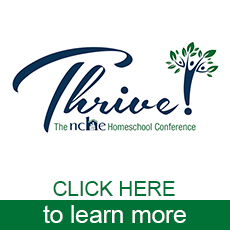
Top 10 NCHE Blog Posts of 2020
 Last year we launched the NCHE Blog for the very first time! This is just one more way that we help parents homeschool with confidence and joy. We hope it has been a great source of information and encouragement to you. We’ve looked back and found our top ten most popular posts from 2020. They are definitely worth reading (or rereading).
Last year we launched the NCHE Blog for the very first time! This is just one more way that we help parents homeschool with confidence and joy. We hope it has been a great source of information and encouragement to you. We’ve looked back and found our top ten most popular posts from 2020. They are definitely worth reading (or rereading).
1. As Homeschooling Grows, Do Children Need More Protection?
2. Choosing a Name for Your Homeschool
3. Bills in the NC General Assembly that Will Affect Homeschoolers
4. The War on Home Education
5. We Can Help You Get Started Homeschooling
6. Six Bugs You Should Not Touch
7. NCHE Responds to the Harvard Summit
8. What Is a Homeschooler?
9. Are You Looking for a Homeschool Group in North Carolina?
10. What Does Racism Have to Do with Homeschooling?
Capitol Riots, Elections, and Censoring, Oh My!

Photo by Edrece Stansberry on Unsplash
How many of us have been expecting, or at least hoping, that 2021 is going to be a better year than 2020? Well, based on how 2021 has started, I’m not holding my breath. Like last year, these last few weeks have provided shocking and ground shifting news in politics and culture. Rioters broke into the US Capitol, Trump refused to attend Biden’s inauguration, and people are being banned from social media for their political views. That is just in the last couple of weeks!
How do we talk about these topics with our children?
Our children don’t need to know everything.
Just to state the obvious, there are some things that our children do not need to know. There are depths of sexual misconduct and graphic violence that are not beneficial or necessary for our children (and many of us adults). Such evil can have a powerful effect on us in producing paralyzing fear or dark temptations. It is right for us to protect them from these kinds of things.
Our children should know what is going on.
Although some level of protection is appropriate, we must not make the mistake of sheltering our children so that they become ignorant and vulnerable. It is our job to prepare them for life. They will have to face reality sometime, and if they encounter it without warning and preparation, it could destroy them. So as it seems appropriate to their maturity, parents should introduce to their children the realities of life and what is occurring in our nation in a way that will empower them to navigate life successfully. This brings me to my final suggestion.
We can provide a biblical perspective on what is happening.
Knowledge without morality has no true value. Knowledge can be useful to accomplish many things, but what we are trying to accomplish matters very much. So as we expose our children to the difficult realities of life, it is our responsibility to provide a moral worldview through which to understand them.
If you are a Christian parent, then that means you help your children to form a biblical worldview. In a biblical worldview, our children will understand God’s creation of the world, his creation of man in his image, the sinful nature of man since the Fall, his love and salvation for us accomplished through Jesus Christ, the standards and benefits of righteousness, and the final judgment. With the historic unity of our nation torn apart, basic morality upended, and the foundational principles of our government under attack, our nation appears to be coming apart at the seams. In spite of all this, a believer in Jesus Christ can process these things with faith, hope, and love.
One thing that we have recently done to help our children to be informed of current events and enlightened with a biblical worldview is to subscribe to the World Watch, daily ten-minute news videos created for young people by World News Group. Their free daily podcast, The World and Everything in It is also a wonderful source for news and perspective.
The most important thing we do as a family is to have lots of discussions about what is happening in the world. When we hear about or encounter difficult current events, we discuss them openly. We answer the children’s questions and try to give them perspective. Our hope is that we will bring up our children to become faithful, hopeful, loving followers of Christ who accomplish his mission in the world.
by Matthew McDill
Resources for Teaching Your Teens to Memorize Scripture
 If you are a Christian parent, then one of your primary goals is to help your children follow Jesus Christ. An important spiritual discipline that will bear significant fruit in your children’s lives is that of memorizing Scripture. Younger children are great at memorizing Scripture; and I think it is fantastic to start as early as possible. The main point of this post, however, is the importance of teaching our older children to establish their own commitment and habit of memorizing Scripture.
If you are a Christian parent, then one of your primary goals is to help your children follow Jesus Christ. An important spiritual discipline that will bear significant fruit in your children’s lives is that of memorizing Scripture. Younger children are great at memorizing Scripture; and I think it is fantastic to start as early as possible. The main point of this post, however, is the importance of teaching our older children to establish their own commitment and habit of memorizing Scripture.
Why is memorizing God’s Word important?
“I have hidden Your Word in my heart
that I might not sin against You.”
Psalm 119:11
When we have God’s Word in our hearts, we are able to recall and meditate on it any time. When Jesus was tempted by Satan as he was fasting in the wilderness for forty day, he responded by quoting God’s Word (Luke 4:1-13). I do not think he pulled some scrolls out of his satchel and asked Satan to wait a moment while he found a passage that addressed each of the temptations. Like most Jewish boys, he had memorized God’s Word.
Why is memorizing God’s Word challenging?
Memorizing Scripture is challenging. It is often challenging because, as a culture, we are not in the habit of memorizing anything. However, the more you do it (and the earlier you teach your children to do it), the more accustomed our minds will become to it. Don’t quit because it is hard at first; keep training your memory muscle, and it will become stronger.
The challenge of memorizing Scripture is not just memorizing it the first time, but remembering it after that. I have spent much time memorizing large portions of Scripture that I did not review and therefore could not remember months later. To remedy this, I use a Scripture Memory Review System. Memorizing scripture and using a review system takes time, but we know it is worth it! Here is David’s conclusion about the words of the Lord,
“More to be desired are they than gold, even much fine gold;
Sweeter also than honey and drippings of the honeycomb.
Moreover, by them is your servant warned;
In keeping them there is great reward!”
Psalm 19:10-11
A Scripture Memory Review System
I am sharing with you my Scripture Memory Review System. This is what I use every day. It is also what I use to teach my teens to memorize God’s Word. It has step by step instructions and charts for keeping up with your progress. Please contact me if you have any questions: matthew.mcdill@nche.com.
“I Don’t Want to Go to College. . . . Wait, Yes, I Do.”
 I’d like to tell you a story about what happened with one of my high school students that points to several important homeschooling principles:
I’d like to tell you a story about what happened with one of my high school students that points to several important homeschooling principles:
- In NC, parents decide what is required for a student to graduate, not the state or any other organization.
- If your student is headed for college, you must determine his high school courses and build a transcript that meet the prospective colleges’ requirements.
- Many colleges (especially community colleges) offer dual enrollment for high school students. Students can take college classes and earn credit for both high school and college.
- Home education provides fantastic flexibility to meet your students’ individual needs and timing.
At the end of my oldest son’s sophomore year, we went out for coffee to plan for his junior year. Boy, was he prepared! He presented a very persuasive argument for only completing one more year of high school. He was not interested in going to college; he was older for his grade, and he was eager to work more and learn business. So, I created an especially difficult “final” year of high school; he completed it diligently, and he graduated.
Can you do that!? Yes, you can. In NC, the parents decide what is required for a student to graduate, not the state or any other organization. You can require more, or less, than what public schools require. You can choose the same subjects or different subjects from those used in public school.
For the next two years my son worked very hard, saved up to buy a very nice used car with cash, and then saved another $15,000. He was also exploring vocational options and praying about what God wanted him to do with his life. At some point in the process, he became interested in law enforcement and began doing research. He quickly discovered that almost every officer he talked with recommended a college degree.
So one day my son said, “Well, Dad, I think I’d like to go to college after all.” To his utter dismay, I replied, “Unfortunately, we only have a three year high school transcript for you. You’ll have to do another year of high school!”
Although parents have the freedom to determine what is required for graduation, preparing your student for college is quite another issue. If your student is headed for college, you must determine his high school courses and build a transcript that meet the prospective colleges’ requirements.
Once my son got over the shock of this news, he agreed to complete another year of high school, because he was so committed to pursuing law enforcement. We put together another year of courses that would meet the requirements of the college in which he was interested. One of the things that really made this bearable for him was dual enrollment. Many colleges (especially community colleges) offer dual enrollment for high school students. Students can take college classes and earn credit for both high school and college. My son felt that he wasn’t just having to “go back” to high school; he was also moving forward with college.
As I look back at this adventure, I would not do it any differently. My son needed to go work and do research to discover what direction he was heading in. Once he had a direction, he was able to chart a path. Most importantly, he had his own personal understanding and motivation of the process. He wasn’t just going to college because that’s what people do. This experience is one of the reasons I love homeschooling so much. Home education provides fantastic flexibility to meet your students’ individual needs and timing. On the other end of the spectrum, I currently have a daughter that would normally be a junior in high school this year. She is young for her grade, felt behind on her work, and wanted to build a good transcript, so she has decided to stay back as a sophomore.
I hope this story will inform you about how homeschooling high school works in NC and encourage you to take full advantage of the wonderful flexibility homeschooling provides to meet the unique needs and timing of each of your children.
Ideas for Homeschool Science
 by Guest Contributor Valerie Cox
by Guest Contributor Valerie Cox
Whether your children realize it or not, science is everywhere in the world around us. From the sunlight waking us up in the morning to how our bodies digest the food we eat, science is a major part of our daily lives. As their educator, it’s important to engage your children with science so they have a better understanding and deeper appreciation of our environment.
1. Question Walks
One way to engage your children with science is to take a “question walk” where they can ask questions about what they see. As your children’s educator, you can take time to explain why the sky is blue or point out different plants and trees along your walk. You could try allowing the children to guide the question walk as much as possible so you can discover any new interests or
curiosities they have, and if you don’t know an answer to their question, you can have your children help you research the answer. It’s important for children to know that science is about continuing to learn even after you graduate from school.
2. Trip to the Zoo
If you are studying animals in your school unit, a trip to the zoo will be a wonderful way for your children to engage with science. You can have your children take journals and write down facts they learn or draw pictures of the animals they see throughout the day. You could also check with your zoo to see if they offer any educational opportunities specifically for homeschool students as this would be another resourceful way for your children to learn more about science and the animal kingdom.
3. Hands-On Experiments
If your children learn better with hands-on learning, performing science experiments would be a smart way to engage your children with science. Many simple science experiments can easily be done at home, and all you need to do is spend a few minutes online researching your different options to find one that is tailored to your children’s ages and scientific interests. If you are studying a specific scientific unit, you can find a coordinating experiment so your children will continue their science learning and have their curiosities piqued. From classic experiments like making a volcano to more in-depth experiments like ones involving dry ice, there is certainly a hands-on science experiment perfect for your children.
4. Build Structures
If your children enjoy playing with building blocks, you can engage your children with science by learning more about architecture and engineering. As you study the building process, you can talk about the different elements (stone, metal, wood, etc.) that most buildings are built with and have it serve as a math integration as well since your children will be calculating building height and other key measurements. You can have your children engineer their own structure or create a replica of a local landmark. If your children aren’t interested in building blocks, you can have them engineer a structure out of items they find around the house like plastic bottles, cardboard boxes, or egg cartons. For a hands-on experiment using engineering skills, you could have your
children create race cars or containers to cushion an egg during an egg drop.
5. Schedule Field Trips
Visiting a museum is a great way to engage your children with science. You can research different museums in your area and look for ones that would appeal to your children. From children’s museums to space museums to museums on specific scientific leaders, you can easily find a museum with a science element within driving distance from your house, and you can easily use this as a field trip opportunity for your children. As your children’s educator, you should think outside of the box! When looking for field trip opportunities, remember that your children can learn a great deal about science by visiting a local farm or manufacturing facility as well as traditional museums. You can sign up to receive communications from area museums so
you can stay up-to-date on new or traveling exhibits and if any museums are offering any education opportunities for homeschool students.
As both your children’s educator and parent, it can be hard to find new ways to engage them with science, but it’s important that your children appreciate how many scientific elements are in the world around them. By taking the time to think outside of the box and look for new opportunities, you can certainly find plenty of ways to engage your children with their scientific interests and curiosities.
![]() Valerie Cox is a contributing writer for LOC Scientific.
Valerie Cox is a contributing writer for LOC Scientific.
We are thankful for our members! Are you a new NCHE member or thinking of becoming a member? Start here.
It’s Time to Apply for NCHE Scholarships!
 NCHE interviews Activities Director Evelyn Bickley to learn more about NCHE scholarships.
NCHE interviews Activities Director Evelyn Bickley to learn more about NCHE scholarships.NCHE: Evelyn, you serve as activities director and that includes serving as the chair of our scholarship committee. Tell us a little about the history of NCHE scholarships.
NCHE: Which scholarships will be awarded in 2021?
NCHE: What is the committee looking for– specifically: what makes a great application?
Why is it more important than ever for families and business owners to consider setting up memorial scholarships or giving to the NCHE scholarship program? How does investing in post-secondary education for homeschooled students benefit the community?
We are thankful for our members! Are you a new NCHE member or thinking of becoming a member? Start here.
Help NCHE Take a Big Step Forward
I’d like to share this video message with you. If you’d rather read about it, see below.
At the beginning of 2019, NCHE took a bold step of faith when the board hired me (Matthew McDill) to be our full-time executive director. I was a part of that decision making process because I had been serving on the board as a volunteer for five years and over a year as president. We recognized that if we were going to fulfill our mission to help the over 90,000 families in NC homeschool with confidence and joy we were going to need additional full-time staff and leadership that could take us to the next level of effective service. In response to the pandemic this year, even more parents are choosing to homeschool. What an opportunity we have to equip parents for this critical calling!
NCHE has had enough money in savings to make this transition, but our annual income does not meet the additional expense of a new full-time employee. We are working to increase our budget to meet this expense as soon as possible. Like so many others, NCHE ran into a major speed bump this year when we had to cancel our 2020 Thrive! Conference. This was a significant loss of income, and so we are working even harder now to meet this new demanding budget.
We believe that we are pursuing God’s mission for us to help parents homeschool with confidence and joy. We do this by protecting your right to homeschool in NC, equipping you with information and encouragement, and connecting you with other families and groups across the state. We believe that your effort to homeschool is vital to the health of your kids, your family, and our nation. We have expanded our ministry to parents this year in exciting ways and have even bigger plans for 2021.
In this year’s December giving campaign, our goal is to raise $37,157. This amount is 25% of our annual staff budget that we are investing in growing the impact of NCHE. Will you please help us meet this new aggressive budget so that we can keep the homeschool movement strong by empowering and protecting even more homeschool families in NC?
Five Ways to Engage Your Children with Science
 by Guest Contributor Valerie Cox
by Guest Contributor Valerie Cox
Whether your children realize it or not, science is everywhere in the world around us. From the
sunlight waking us up in the morning to how our bodies digest the food we eat, science is a
major part of our daily lives. As their educator, it’s important to engage your children with
science so they have a better understanding and deeper appreciation of our environment.
1. Question Walks
One way to engage your children with science is to take a “question walk” where they can ask
questions about what they see. As your children’s educator, you can take time to explain why the
sky is blue or point out different plants and trees along your walk. You could try allowing the
children to guide the question walk as much as possible so you can discover any new interests or
curiosities they have, and if you don’t know an answer to their question, you can have your
children help you research the answer. It’s important for children to know that science is about
continuing to learn even after you graduate from school.
2. Trip to the Zoo
If you are studying animals in your school unit, a trip to the zoo will be a wonderful way for your
children to engage with science. You can have your children take journals and write down facts
they learn or draw pictures of the animals they see throughout the day. You could also check
with your zoo to see if they offer any educational opportunities specifically for homeschool
students as this would be another resourceful way for your children to learn more about science
and the animal kingdom.
3. Hands-On Experiments
If your children learn better with hands-on learning, performing science experiments would be a
smart way to engage your children with science. Many simple science experiments can easily be
done at home, and all you need to do is spend a few minutes online researching your different
options to find one that is tailored to your children’s ages and scientific interests. If you are
studying a specific scientific unit, you can find a coordinating experiment so your children will
continue their science learning and have their curiosities piqued. From classic experiments like
making a volcano to more in-depth experiments like ones involving dry ice, there is certainly a
hands-on science experiment perfect for your children.
4. Build Structures
If your children enjoy playing with building blocks, you can engage your children with science
by learning more about architecture and engineering. As you study the building process, you can
talk about the different elements (stone, metal, wood, etc.) that most buildings are built with and
have it serve as a math integration as well since your children will be calculating building height
and other key measurements. You can have your children engineer their own structure or create a
replica of a local landmark. If your children aren’t interested in building blocks, you can have
them engineer a structure out of items they find around the house like plastic bottles, cardboard
boxes, or egg cartons. For a hands-on experiment using engineering skills, you could have your
children create race cars or containers to cushion an egg during an egg drop.
5. Schedule Field Trips
Visiting a museum is a great way to engage your children with science. You can research
different museums in your area and look for ones that would appeal to your children. From
children’s museums to space museums to museums on specific scientific leaders, you can easily
find a museum with a science element within driving distance from your house, and you can
easily use this as a field trip opportunity for your children. As your children’s educator, you
should think outside of the box! When looking for field trip opportunities, remember that your
children can learn a great deal about science by visiting a local farm or manufacturing facility as
well as traditional museums. You can sign up to receive communications from area museums so
you can stay up-to-date on new or traveling exhibits and if any museums are offering any
education opportunities for homeschool students.
As both your children’s educator and parent, it can be hard to find new ways to engage them
with science, but it’s important that your children appreciate how many scientific elements are in
the world around them. By taking the time to think outside of the box and look for new
opportunities, you can certainly find plenty of ways to engage your children with their scientific
interests and curiosities.
![]() Valerie Cox is a contributing writer for LOC Scientific.
Valerie Cox is a contributing writer for LOC Scientific.
We are thankful for our members! Are you a new NCHE member or thinking of becoming a member? Start here.
National Black Home Educators
 Are you a black homeschool family in North Carolina? We’d love to get connected with you and serve you in any way that we can. You can learn more about North Carolinians for Home Education and how to become a member here. If you have any question, please contact me at matthew.mcdill@nche.com.
Are you a black homeschool family in North Carolina? We’d love to get connected with you and serve you in any way that we can. You can learn more about North Carolinians for Home Education and how to become a member here. If you have any question, please contact me at matthew.mcdill@nche.com.
National Black Home Educators is a wonderful organization that can also be a support to you on your homeschool journey. This year is their 20th anniversary and they have produced this inspiring video about homeschooling and their organization.
by Matthew McDill
This Year, Partner with NCHE in a New Way
“Then He said to His disciples, ‘The harvest is plentiful but the laborers are few.”” Matthew 9:38
This year our family had a small garden. Let me rephrase that: this year our family had a very small garden. We grew tomatoes, peppers, carrots, and spinach. It was fun, but it was far from a plentiful harvest. When Jesus says, “The harvest is plentiful” I don’t picture our tiny family garden. I imagine fields and fields and fields of plants with stalks that are overflowing with delectable, abundant, overripe fruit. I can’t imagine knowing that there are acres of sweet, juicy, low-hanging fruit and no one caring– or even noticing. But that’s the scenario Jesus paints in Matthew 9. It wasn’t that the people were few, it’s that those who were willing to work were few.

Since 1984, NCHE has worked to help families homeschool their children. No one has worked harder than NCHE to protect your right to homeschool, equip you with the resources and encouragement that you need, and connect you with other homeschooling families and opportunities. Our mission is simple, but it isn’t easy. This year’s explosive growth in home education has been thrilling to behold! Today, there is a very real harvest. Have you noticed? If you have noticed, are you doing anything about it?
As the homeschool movement grows, it will take more workers and volunteers than ever to accomplish our mission of helping parents homeschool with confidence and joy. It’s easy to be filled with hope when you see parents leading their children– or children growing in character, courage, and compassion in addition to reading, writing, and arithmetic. Families are being transformed; generations are being transformed! Our mission to equip and encourage families is truly meaningful work.

After Jesus said to his disciples, “The harvest is plentiful but the workers are few,” He said, “Ask the Lord of the harvest, therefore, to send out workers into his harvest field.” (Matthew 9:39)
Since August, our board has been asking God to send workers to join us, and I hope that you will!
– Sarah
We are thankful for our members! Are you a new NCHE member or thinking of becoming a member? Start here.




